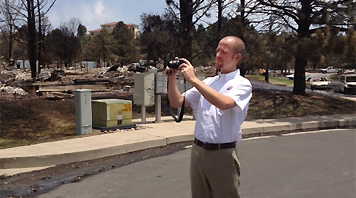|
RMIIA News Releases7951 E. Maplewood Avenue, Suite 110 Contact: Carole Walker, Executive Director Insurance Advice for Residents Both In and Out of the Path of Colorado Wildfires June 22, 2010 – With another day of high fire danger and four wildfires still burning in Colorado, people need to think about what to do in case of an evacuation and how their insurance works if they suffer fire damage. In the Parkdale Canyon Fire burning near Cañon City, property owners and renters who are under a mandatory evacuation order may likely have additional living expense available to them under their homeowners or renters insurance policy. Even if you're not in the immediate path of a fire, you need to prepare and have a plan in place before you find yourself in the path of a raging wildfire. Now is the time to develop an evacuation plan and make sure you have insurance protection for your home and personal belongings. "This week is Colorado Lightning Safety and Wildfire Awareness Week and these fires are a vivid reminder of how little time there is to react when a wildfire threatens," says Carole Walker, Executive Director of the Rocky Mountain Insurance Information Association. "Unfortunately, most people don't think about how they will escape and what insurance protection they have to rebuild and replace their belongings until something unthinkable occurs." The last wildfire to impact Cañon City was the 2002 Iron Mountain Fire that resulted in about $9 million in insured damage. People should review what their insurance covers, policy dollar limits, deductibles and protection for personal belongings. Most insurance policies also cover additional living expenses if you are unable to live in your house or apartment because of a fire or other covered peril. Most policies will reimburse you the difference between your additional living expenses and your normal living expenses, but do have set limits on the amount they will pay.
RMIIA offers this insurance checklist:
Log on to www.rmiia.org for more information. ### Rocky Mountain Insurance Information Association is a non-profit consumer information organization. Affiliated with the Insurance Information Institute, RMIIA has been serving consumers and the media since 1952. |
|
303-790-0216 • 800-355-9524 • Contact Us • Legal Notice, Disclaimer & Terms of Use
Home • About RMIIA • News Room • P&C Insurance Industry • Auto • Homeowners • Business • Catastrophes • Agent Resources • Events & Education • Brochures

